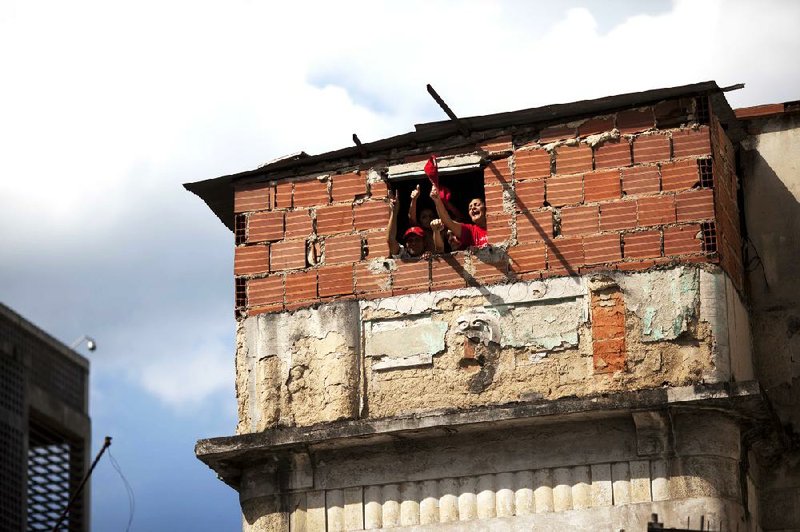CARACAS, Venezuela - Venezuelan opposition leaders condemned the government Thursday for its attempt to subdue a protest movement with nighttime sweeps that have turned many parts of the country into dangerous free-fire zones.
Police, National Guard troops and members of private militias have swarmed through the streets in the capital and elsewhere firing volleys, at times indiscriminately, in repeated spasms of nighttime violence in recent days.
Henrique Capriles, the two-time presidential candidate of an opposition coalition, said the government has engaged in “brutal repression” as it goes after students and other protesters, in some cases breaking into apartment buildings to arrest those it accuses of taking part in an attempted coup.
“What does the government want, a civil war?” Capriles asked at a news conference.
David Smolansky, a mayor of a district in Caracas and member of the Popular Will party, said arrest of the party’s leader, Leopoldo Lopez, and a manhunt for two other party members are part of the harshest wave of political persecution in decades.
“If this isn’t a totalitarian system then I don’t know what can explain what is happening in this country,” Smolansky said.
A week of protests, beginning with a mass opposition rally Feb. 12, has resulted in at least six deaths and more than 100 injuries.
While several large demonstrations by thousands of people have been peaceful, smaller groups of protesters have lobbed gas bombs and rocks and blocked streets with flaming barricades of trash.
Troops and police have responded with tear gas, rubber bullets and blasts from water cannons - as well as raids by gun-firing men on motorcycle.
The clashes with authorities as well as the pursuit of anti-government activists by troops and militias take place in darkness.
During the day, the capital has largely operated as normal, with businesses and schools open and people going about their business, while stocking up on groceries in case of unrest.
President Nicolas Maduro and his supporters, meanwhile, said the escalating protests against his socialist government in the oil-rich but economically struggling country are part of an attempted coup sponsored by rightist and “fascist” opponents in Venezuela and abroad, particularly the United States.
Maduro has vowed to crack down on the protests, particularly in Tachira, on the western border with Colombia, where the unrest has been particularly strong.
The interior ministry said Thursday that it would send a battalion of paratroopers to the area to restore order.
Interior Minister Migues Rodriguez Torres said that sending troops to the border city of San Cristobal, an opposition stronghold where Maduro has said he would consider imposing martial law, is necessary because unrest has prevented people from going about their daily business.
“It’s not about militarization, it’s simply meant to restore order,” he said.
San Cristobal Vice Mayor Sergio Vergara, a member of the opposition Popular Will party, said parts of the city have been without public transportation and Internet service in recent days and that the presence of some 3,000 troops in a city of 600,000 is “effectively part of a effort at repression being played out by the government across the country.”
Earlier Thursday, a judge ruled there was enough evidence to hold Lopez, the leader of Popular Will who surrendered to authorities before thousands of cheering supporters this week, on charges that include arson and criminal incitement stemming from a Feb. 12 rally.
Prosecutors decided not to pursue more serious charges, including homicide and terrorism, when Lopez made a court appearance at a military base outside Caracas as violence flared across much of the country. The 42-year-old politician could face at least 10 years in prison.
In a message from his Twitter account, the opposition leader’s wife, Lilian Tintori, urged his followers on as she confirmed that he would remain in jail.
“Change is within us all,” she wrote on his behalf. “Don’t give up. I will not.”
In the hours before the decision, Maduro had suggested in a nationally broadcast speech that Lopez would remain in custody and face criminal charges.
“I won’t allow him to challenge the people of Venezuela, the constitution,” he said.
Throughout Wednesday night, anti-government protesters in Caracas and other cities set trash fires in streets and threw rocks at National Guard troops, who fired tear gas, water cannons and rubber bullets.
The opposition is planning marches across the country Saturday to protest the jailing of Lopez as well as well as the rampant crime, shortages of consumer goods and inflation rate of more than 50 percent that has made life difficult for many in the country of nearly 30 million people.
Information for this article was contributed by Fabiola Sanchez, Andrew Rosati and Vivian Sequera of The Associated Press.
Front Section, Pages 2 on 02/21/2014
